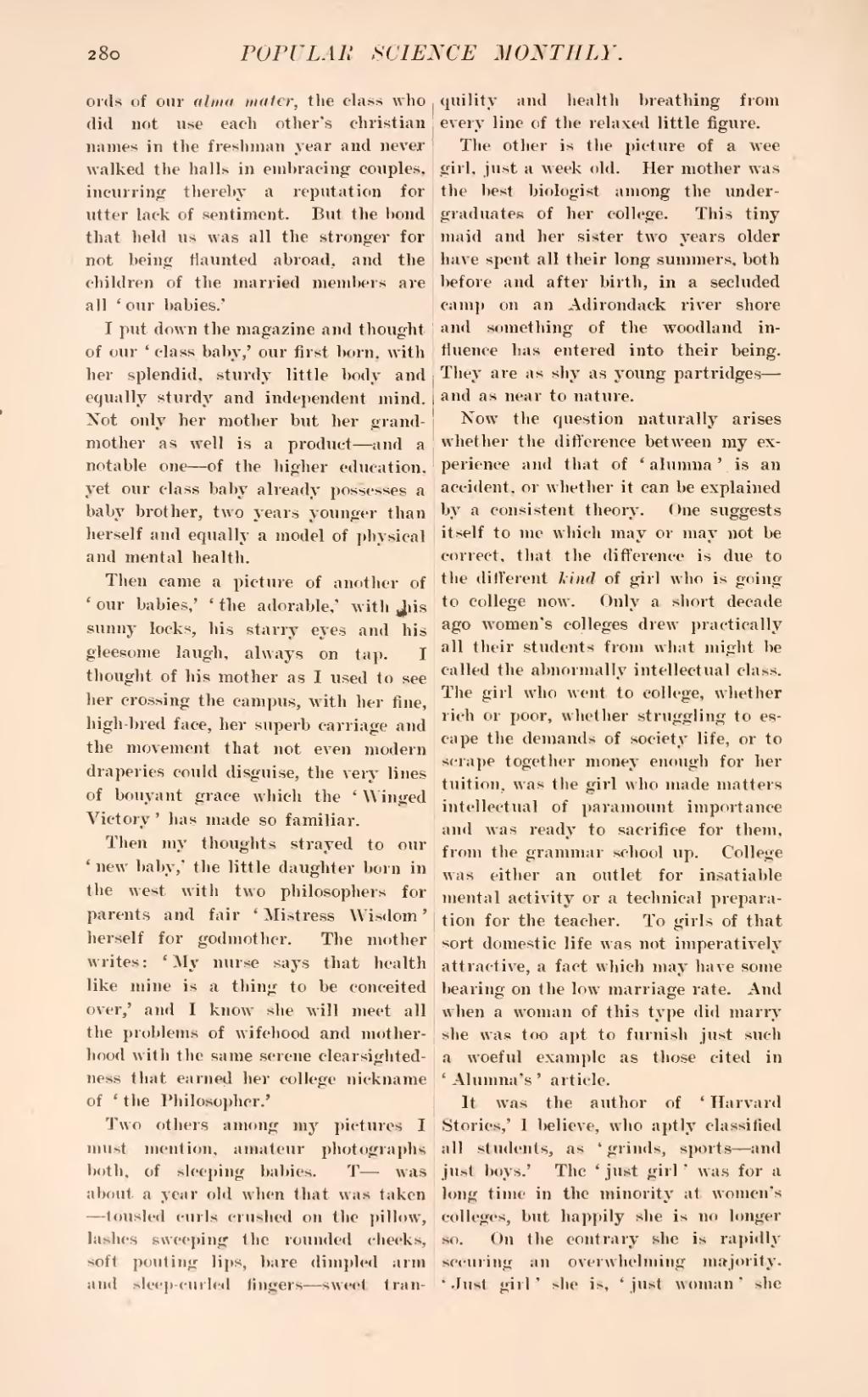ords of our alma mater, the class who did not use each other's christian names in the freshman year and never walked the halls in embracing couples, incurring thereby a reputation for utter lack of sentiment. But the bond that held us was all the stronger for not being flaunted abroad, and the children of the married members are all 'our babies.'
I put down the magazine and thought of our 'class baby,' our first born, with her splendid, sturdy little body and equally sturdy and independent mind. Not only her mother but her grandmother as well is a product—and a notable one—of the higher education, yet our class baby already possesses a baby brother, two years younger than herself and equally a model of physical and mental health.
Then came a picture of another of 'our babies,' 'the adorable,' with his sunny locks, his starry eyes and his gleesome laugh, always on tap. I thought of his mother as I used to see her crossing the campus, with her fine, high-bred face, her superb carriage and the movement that not even modern draperies could disguise, the very lines of bouyant grace which the 'Winged Victory' has made so familiar.
Then my thoughts strayed to our 'new baby,' the little daughter born in the west with two philosophers for parents and fair 'Mistress Wisdom' herself for godmother. The mother writes: 'My nurse says that health like mine is a thing to be conceited over,' and I know she will meet all the problems of wifehood and motherhood with the same serene clearsightedness that earned her college nickname of 'the Philosopher.'
Two others among my pictures I must mention, amateur photographs both, of sleeping babies. T was about a year old when that was taken—tousled curls crushed on the pillow, lashes sweeping the rounded cheeks, soft pouting lips, bare dimpled arm and Bleep-curled lingers—sweet tranquility and health breathing from every line of the relaxed little figure.
The other is the picture of a wee girl, just a week old. Her mother was the best biologist among the undergraduates of her college. This tiny maid and her sister two years older have spent all their long summers, both before and after birth, in a secluded cam]) on an Adirondack river shore and something of the woodland influence has entered into their being. They are as shy as young partridges—and as near to nature.
Now the question naturally arises whether the difference between my experience and that of 'alumna', is an accident, or whether it can be explained by a consistent theory. One suggests itself to me which may or may not be correct, that the difference is due to the different kind of girl who is going to college now. Only a short decade ago women's colleges drew practically all their students from what might lie called the abnormally intellectual class. The girl who went to college, whether rich or poor, whether struggling to escape the demands of society life, or to scrape together money enough for her tuition, was the girl who made matters intellectual of paramount importance and was ready to sacrifice for them, from the grammar school up. College was either an outlet for insatiable mental activity or a technical preparation for the teacher. To girls of that sort domestic life was not imperatively attractive, a fact which may have some bearing on the low marriage rate. And when a woman of this type did marry she was too apt to furnish just such a woeful example as those cited in 'Alumna's' article.
It was the author of 'Harvard Stories,' 1 believe, who aptly classified all students, as 'grinds, sports—and just boys.' The 'just girl' was for a long time in the minority at women's colleges, but happily she is no longer so. On the contrary she is rapidly securing an overwhelming majority. lust girl' she is, 'just woman' she
